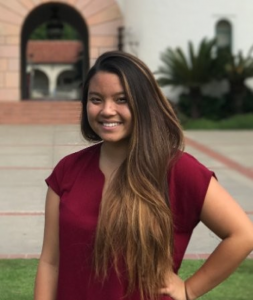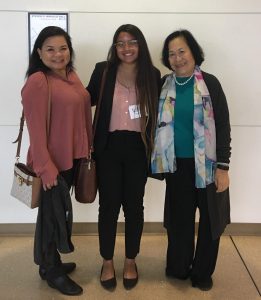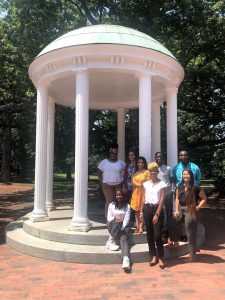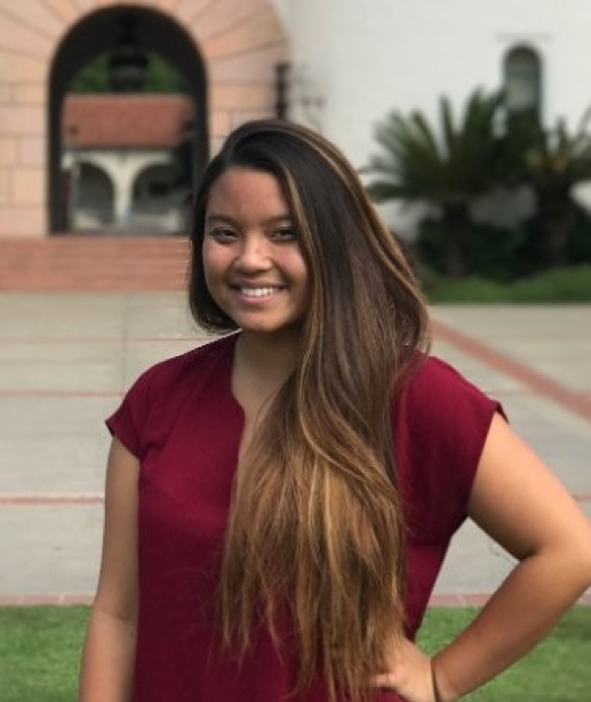In May of 2018, Talia Kieu joined IMSD as a third year student majoring in Public Health and minoring in Women’s Studies and LGBTQ Studies. She works in Dr. Calzo’s Action Research on Community Health Equity and Stigma (ARCHES) lab studying LGBTQ+ youth, transgender individuals with eating disorders, and homeless LGBTQ+ young adults. Their research group examines the health disparities that are faced by these populations and create evidence-based health interventions for them. Talia was able to present her research at San Diego State University’s Student Research Symposium (SRS), where she received the highly competitive President’s Award for Research in the College of Health and Human Services.

Through this award, Talia qualified to present at the 33rd Annual California State University Student Research competition in April of 2019, where all 22 CSU campuses were represented by their all-star undergraduate researchers. Talia was funded to travel to California State University Fullerton (CSUF) to present her research on Hepatitis A and the homelessness crisis in San Diego. Talia’s project utilized qualitative community-based participatory research (CBPR) methods with PhotoVoice as a means of engaging her research participants and highlighting their voice throughout the process. Talia expanded the applicability of her work to touch on similar issues surfacing in the Fullerton/Orange County surrounding homelessness and lack of access to community resources. As an added bonus, in addition to presenting in front of many colleagues and experts in the field, Talia’s mother and grandmother were also able to see her present her research for the first time.

Prior to presenting at CSUF, Talia had the opportunity to share her work, “ Effects of San Diego Hepatitis A Outbreak on Transitional Aged Youth Using PhotoVoice and Community Based Participatory Research, at the Annual Biomedical Research Conference for Minority Students (ABRCMS). There, she presented a map of San Diego resources and health interventions for homeless individuals and how they were being utilized. She won the Outstanding Oral Presentation Award and said she, “gained confidence and ownership over my research topic” by presenting at ABRCMS and being awarded. Through the support of the NIH-funded IMSD Program, Talia was also able to present her research at University of North Carolina (UNC)- Chapel Hill, where she received valuable feedback from experts in qualitative and community-based methodology. All of these experiences made Talia a strong candidate for winning at SDSU’s SRS and indubitably helped her qualify to present at CSUF.
Currently, Talia is spending her summer at UNC-Chapel Hill where she is diversifying her research portfolio by working in a wetlab with her new PI, Dr. Folami Ideraabdullah on Project Imhotep, investigating human samples and animal models to study the role of diet in epigenetic programming during fetal development. Their project will assess the effect of suboptimal diet during pregnancy on offspring DNA methylation states using samples that have been previously generated. This is a completely new area for Talia, but she was excited to have the opportunity to study something new in public health and add to her skill sets, especially before she applies to graduate school in Fall 2019.

As Talia reflected on her research experiences and in presenting her work, she realized how much she has improved as a scientist and presenter. When Talia talked about her growth, she emphasized that “being able to present so many iterations of the same project as it gained momentum over time was amazing, especially with support from the IMSD family.” As Talia continues her journey as an undergraduate student, it is clear she has great support from her family and the IMSD program.
